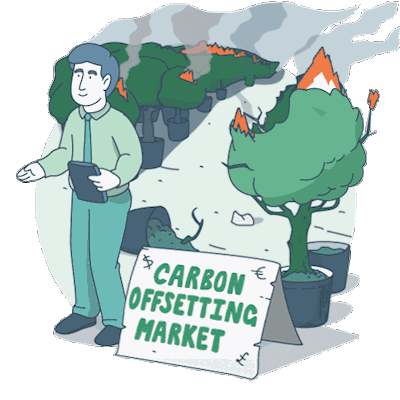You are using an outdated browser. Please upgrade your browser to improve your experience.
Article | 24 June 2022 | ESG

The carbon offset market under scrutiny
As the world faces the challenge of transitioning to a carbon-free future by 2050, companies are facing pressure to operate their businesses more sustainably to meet ambitious net-zero targets. Ideally by restricting their carbon impact. Meanwhile, for those businesses that cannot meet their carbon emission targets right away, they can reach their zero-carbon goals with the help of the booming carbon offset markets. This is where companies can buy permits – or carbon credits – generated by projects that are cleaning up our atmosphere, to compensate for the emissions they haven’t yet eliminated. Last year, global carbon markets exceeded $1 billion for the first time driven by corporate commitments. Contributing to diverse projects such as planting mangrove forests in wetlands in the Philippines, building wind turbines in India or working with French farmers to identify carbon farming practices.
Most of this happened in heavily regulated compliance markets, where mandatory laws require major emitters of greenhouse gases to buy permits or credits. Then there are voluntary carbon markets (VCMs), created by independent entities, where corporations and institutions and even individuals purchase credits to reduce their carbon footprint. In theory, properly designed, rigorous offsets are a useful short-term tool to achieve net zero before sorting the root cause of the emissions. But markets that connect businesses hoping to offset their carbon emissions with climate change mitigation projects have been plagued by problems. With many cases of planting programmes issuing credits but under delivering often because insufficient care was taken. Or damaging wildfires such as those in the US last summer that destroyed forests used in offsetting schemes by companies such as BP and Microsoft.
Voluntary markets are growing rapidly to keep up with demand, but the rapid scaling of the VCMs presents challenges. The market is rife with low-quality carbon projects that are not delivering on promised climate benefits. And carbon prices in most regions remain below the levels needed to drive changes to meet the Paris Agreement - the international climate treaty. Encouragingly, there have been some promising signs over the past year. Recently, the World Bank reported that in 2021, that carbon prices have hit record highs in many regions. There was also progress towards resolving cross-border issues related to carbon pricing and the adoption of new rules for international carbon markets that was agreed at COP26 in Glasgow, which helps set a clearer policy direction.

Our view
We believe strategies to avoid, reduce and substitute carbon emissions should come before offsetting. However, we agree that carbon offsets are an important tool to help the world reach net zero particularly when offsetting unavoidable greenhouse gases. But without a proper, effective marketplace with quality and standardisation at its core, the voluntary market risks falling apart. We believe that a global carbon price would be beneficial with $100 per metric ton suggested by the UN Global Compact organisation as the minimum price needed to spur innovation and unlocking investment. But the World Bank’s report is encouraging. Let’s hope that the global cooperation agreed at Glasgow’s COP26 can reinvigorate the integrity of the VCMs, moving it into a robust functioning market.